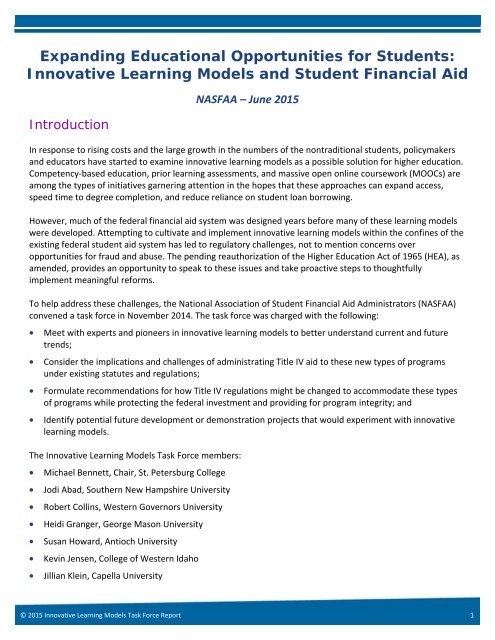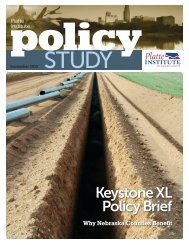INNOVATIVE LEARNING MODELS
Innovative_Learning_ModelsTFReport
Innovative_Learning_ModelsTFReport
You also want an ePaper? Increase the reach of your titles
YUMPU automatically turns print PDFs into web optimized ePapers that Google loves.
Expanding Educational Opportunities for Students:Innovative Learning Models and Student Financial AidIntroductionNASFAA – June 2015In response to rising costs and the large growth in the numbers of the nontraditional students, policymakersand educators have started to examine innovative learning models as a possible solution for higher education.Competency-based education, prior learning assessments, and massive open online coursework (MOOCs) areamong the types of initiatives garnering attention in the hopes that these approaches can expand access,speed time to degree completion, and reduce reliance on student loan borrowing.However, much of the federal financial aid system was designed years before many of these learning modelswere developed. Attempting to cultivate and implement innovative learning models within the confines of theexisting federal student aid system has led to regulatory challenges, not to mention concerns overopportunities for fraud and abuse. The pending reauthorization of the Higher Education Act of 1965 (HEA), asamended, provides an opportunity to speak to these issues and take proactive steps to thoughtfullyimplement meaningful reforms.To help address these challenges, the National Association of Student Financial Aid Administrators (NASFAA)convened a task force in November 2014. The task force was charged with the following:Meet with experts and pioneers in innovative learning models to better understand current and futuretrends;Consider the implications and challenges of administrating Title IV aid to these new types of programsunder existing statutes and regulations;Formulate recommendations for how Title IV regulations might be changed to accommodate these typesof programs while protecting the federal investment and providing for program integrity; andIdentify potential future development or demonstration projects that would experiment with innovativelearning models.The Innovative Learning Models Task Force members:Michael Bennett, Chair, St. Petersburg CollegeJodi Abad, Southern New Hampshire UniversityRobert Collins, Western Governors UniversityHeidi Granger, George Mason UniversitySusan Howard, Antioch UniversityKevin Jensen, College of Western IdahoJillian Klein, Capella University© 2015 Innovative Learning Models Task Force Report 1



